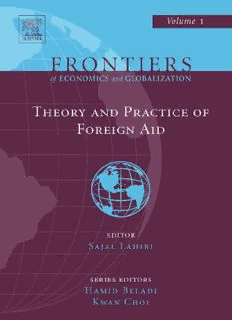Table Of ContentTHEORYANDPRACTICEOFFOREIGNAID
FRONTIERS OF ECONOMICS
AND GLOBALIZATION
1
SeriesEditors:
HAMIDBELADI
UniversityofTexasatSanAntonio,USA
E.KWANCHOI
IowaStateUniversity,USA
Amsterdam–Boston–Heidelberg–London–NewYork–Oxford–Paris
SanDiego–SanFrancisco–Singapore–Sydney–Tokyo
THEORY AND PRACTICE
OF FOREIGN AID
Editedby
SajalLahiri
VandeveerProfessorofEconomics,
SouthernIllinoisUniversityatCarbondale,USA
Amsterdam–Boston–Heidelberg–London–NewYork–Oxford–Paris
SanDiego–SanFrancisco–Singapore–Sydney–Tokyo
Elsevier
Radarweg29,POBox211,1000AEAmsterdam,TheNetherlands
TheBoulevard,LangfordLane,Kidlington,OxfordOX51GB,UK
Firstedition2007
Copyright©2007ElsevierB.V.Allrightsreserved
Nopartofthispublicationmaybereproduced,storedinaretrievalsystemortransmittedinanyform
orbyanymeanselectronic,mechanical,photocopying,recordingorotherwisewithoutthepriorwritten
permissionofthepublisher
PermissionsmaybesoughtdirectlyfromElsevier’sScience&TechnologyRightsDepartmentinOx-
ford,UK:phone(+44)(0)1865843830;fax(+44)(0)1865853333;email:[email protected].
AlternativelyyoucansubmityourrequestonlinebyvisitingtheElsevierwebsiteathttp://elsevier.com/
locate/permissions,andselectingObtainingpermissiontouseElseviermaterial
Notice
Noresponsibilityisassumedbythepublisherforanyinjuryand/ordamagetopersonsorpropertyas
amatterofproductsliability,negligenceorotherwise,orfromanyuseoroperationofanymethods,
products,instructionsorideascontainedinthematerialherein.Becauseofrapidadvancesinthemed-
icalsciences,inparticular,independentverificationofdiagnosesanddrugdosagesshouldbemade
LibraryofCongressCataloging-in-PublicationData
AcatalogrecordforthisbookisavailablefromtheLibraryofCongress
BritishLibraryCataloguinginPublicationData
AcataloguerecordforthisbookisavailablefromtheBritishLibrary
ISBN-13:978-0-444-52765-3
ISSN: 1574-8715
ForinformationonallElsevierpublications
visitourwebsiteatbooks.elsevier.com
PrintedandboundinTheNetherlands
07 08 09 10 11 10 9 8 7 6 5 4 3 2 1
Inmemoryofmyparents
Dipaliand Samarendra NathLahiri
This page intentionally left blank
ABOUTTHESERIES:
FRONTIERSOFECONOMICSANDGLOBALIZATION
Thisseriesisaimedateconomistsandfinancialeconomistsworldwideandwillpro-
videanindepthlookatcurrentglobaltopics.Eachvolumeintheserieswillfocuson
specialized topics for greater understanding of the chosen subject and provide a de-
taileddiscussionofemergingissues.Thetargetaudiencesareprofessionalresearchers,
graduatestudents,andpolicymakers.Itwilloffercutting-edgeviewsonnewhorizons
anddeepentheunderstandingintheseemergingtopics.
Withcontributionsfromleadingresearchers,eachvolumepresentsafreshlookat
today’s current topics. This series will present primarily original works, and employ
referencesappropriatetothetopicbeingexplored.
Each volume will bring a set of highly concentrated articles that will provide in
depth knowledge to a target audience, while the entire series will appeal to a wide
audiencebyprovidingthemwithdeeperknowledgeonabroadsetofemergingtopics
intheglobaleconomy.
TheFrontiersofEconomicsandGlobalizationserieswillpublishontopicssuchas:
– FrontiersofTradeNegotiations
– FrontiersofDerivativePricing
– FrontiersofInternationalLendingandDebtproblems
– FrontiersofEconomicsIntegration
– FrontiersofTradeandEnvironment
– FrontiersofForeignExchange
– FrontiersofInternationalFinance
– FrontiersofGrowthofOpenEconomies
– FrontiersofFuturesPricing
– FrontiersofInternationalFinancialMarkets
– FrontiersofInvestmentBanking
– FrontiersofMergersandAcquisitions
– FrontiersofGovernmentPolicyandRegulations
– FrontiersofMulti-SectorGrowthModels
– FrontiersofIntellectualPropertyRights
– FrontiersofFragmentationsandOutsourcing
SeriesEditors
HamidBeladi
E.KwanChoi
This page intentionally left blank
ABOUTTHEVOLUME
AbouttheEditor:SajalLahiriistheVandeveerProfessorofEconomicsattheSouth-
ernIllinoisUniversity–Carbondale;hasworkedasconsultantstotheFAO,IFAD,and
theWorldBank;haswrittenextensivelyintopeconomicsjournalsonissuesrelatedto
developmentingeneralandtoforeignaidinparticular.
About the Volume: The volume contains contributions on both the theoretical and
empiricalsidesoftheliteratureonaid,andhasequalemphasisonboth.Onthetheo-
reticalside,theanalysisofthetransferparadoxhasevolvedprimarilyinthecontextof
traditionalstaticmodels.However,givendevelopmentsinthepolicyarenaaswellin
thedisciplineitself,thereisaneedforfurtherdevelopmentsinthetheoreticalanalysis
offoreignaid.Thetheoreticalcontributionsinthisvolumewilldopreciselythat.For
example,aiddependence,theimpactofaidonsaving,investmentandgrowthcallsfor
anintertemporalframework.Developmentofspatialeconomicscallsforintroduction
ofthespatialdimensiontotheanalysisofforeignaid.Similarly,thepotentialroleof
aid in conflict resolution, in improving the environment, in public good (infrastruc-
tural) provision and in the establishment of good governance are some of the issues
thetheoreticalcontributionsconsider.
On the empirical side, the issue of the effectiveness of aid; fiscal implications of
aid, the determinants of aid; the allocation criteria for aid; the relationship between
aid and trade, and aid and poverty remain as important as ever. The contributions
in this volume look at these issues from a number of different perspectives, using a
number of different methodologies and different types of data sets (time series data
fromAfrica,cross-countrydata,andpaneldata).
Aim and Scope of the Volume: This volume contains a comprehensive analysis of
foreign aid from both theoretical and empirical perspectives, written by leading re-
searchersinthefield.Thebookshouldbeanessentialtoolforbothundergraduateand
graduatestudentsofdevelopmentstudies,researchersinthefield,andpolicymakers
trainedineconomics.
Acknowledgements: I would like to thank all the authors for their cooperation, to
mywifeDipaforhersupportandunderstanding,andtoProfessor HamidBeladifor
immediateandhelpfulresponsestoallmyqueries.
Description:The analysis of the transfer paradox has evolved primarily in the context of traditional static models. However, given developments in the policy arena as well in the discipline itself, there is a need for further developments in the theoretical analysis of foreign aid. For example, the impact of ai

